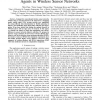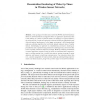469 search results - page 67 / 94 » Impact of Radio Irregularity on Wireless Sensor Networks |
131
click to vote
ICC
2009
IEEE
14 years 11 months ago
2009
IEEE
Compared to conventional wireless sensor networks (WSNs) that are operated based on the client-server computing model, mobile agent (MA) systems provide new capabilities for energy...
143
click to vote
EWSN
2007
Springer
16 years 1 months ago
2007
Springer
Duty-cycling in wireless sensor networks (WSNs) has both beneficial effects on network lifetime and negative effects on application performance due to the inability of a sensor to ...
136
click to vote
EWSN
2010
Springer
15 years 11 months ago
2010
Springer
Multi-hop routing in wireless sensor networks (WSNs) offers little protection against deception through replaying routing information. This defect can be taken advantage of by an a...
135
click to vote
ANSS
2007
IEEE
15 years 8 months ago
2007
IEEE
Data propagation in wireless sensor networks is usually performed as a multihop process. To deliver a single message, the resources of many sensor nodes are used and a lot of ener...
129
click to vote
IJSNET
2006
15 years 1 months ago
2006
: To extend the functional lifetime of battery-operated Wireless Sensor Networks (WSNs), stringent sleep scheduling strategies with communication duty cycles running at sub-1% rang...


